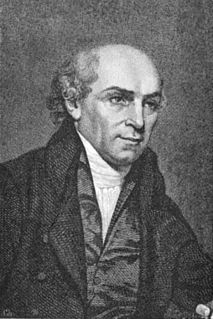A Quote by Matt Ridley
The fuel on which science runs is ignorance. Science is like a hungry furnace that must be fed logs from the forests of ignorance that surround us. In the process, the clearing we call knowledge expands, but the more it expands, the longer its perimeter and the more ignorance comes into view.
Related Quotes
We have heard of a Society for the Diffusion of Useful Knowledge. It is said that knowledge is power, and the like. Methinks there is equal need of a Society for the Diffusion of Useful Ignorance, what we will call Beautiful Knowledge, a knowledge useful in a higher sense: for what is most of our boasted so-called knowledge but a conceit that we know something, which robs us of the advantage of our actual ignorance? What we call knowledge is often our positive ignorance; ignorance our negative knowledge.
Science is being daily more and more personified and anthromorphized into a god. By and by they will say that science took our nature upon him, and sent down his only begotten son, Charles Darwin, or Huxley, into the world so that those who believe in him, &c.; and they will burn people for saying that science, after all, is only an expression for our ignorance of our own ignorance.
Ever since the beginning of modern science, the best minds have recognized that "the range of acknowledged ignorance will grow with the advance of science." Unfortunately, the popular effect of this scientific advance has been a belief, seemingly shared by many scientists, that the range of our ignorance is steadily diminishing and that we can therefore aim at more comprehensive and deliberate control of all human activities. It is for this reason that those intoxicated by the advance of knowledge so often become the enemies of freedom.
The Socratic maxim that the recognition of our ignorance is the beginning of wisdom has profound significance for our understanding of society. Most of the advantages of social life, especially in the more advanced forms that we call "civilization" rest on the fact that the individual benefits from more knowledge than he is aware of. It might be said that civilization begins when the individual in the pursuit of his ends can make use of more knowledge than he has himself acquired and when he can transcend the boundaries of his ignorance by profiting from knowledge he does not himself possess.
In one period the grossest ignorance and barbarism prevailed in the world; and afterwards, in a more enlightened age, the most daring infidelity, and contempt of God; so that the world which was once over-run with ignorance, now by wisdom knew not God, but changed the glory of the incorruptible God as much as in the most barbarous ages, into an image made like to corruptible man, and to birds, and four-footed beasts, and creeping things. Nay, as they increased in science and politeness, they ran into more abundant and extravagant idolatries.

































